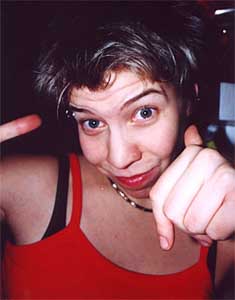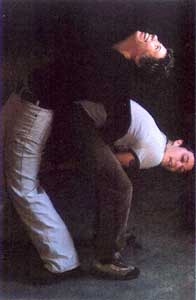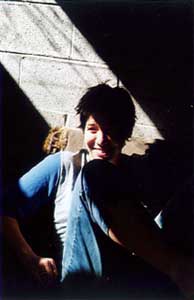-
- Gov. Davis works to shore up gay support
- Researchers study smallpox vaccine
- Second suit filed challenging AB 205
- Kerry targets GOP over offensive t-shirts
- San Francisco syphilis epidemic worsens
- N.Y. Conservative Party boss slams Dems on gay marriage
- Man with HIV appeals denial of kidney transplant
- New Jersey supports civil unions
- National News Briefs
- World News Briefs
Arts & Entertainment
Alix Olson slams through town
Radical lesbian slam poet a hit at Dyke March
Published Thursday, 02-Oct-2003 in issue 823
Although some academics criticize the spoken word, denying its entry into the world of literary genius as mediocre and unworthy, a generation of poets, not unlike their beatnik predecessors from the early 20th century, have really been shaking up the foundation and meaning of poetry across the nation, especially in the last decade.
For instance, it is not uncommon to find poets sharing the stage of open-mic nights in various coffee houses and bars across the country with their acoustic rock peers, or to see advertised various “Slam Poet” contests.
Experiences and forms of the slam poet obviously vary. For some slam contestants, this means talking really loudly using one profanity after another as rapidly as possible to shock and dismay. For others, it is a tool of revolution; an opportunity to create art on the spot; a moment of poetry that is interactive and visceral. There are poems with accompanying drums, interpretive dance, guitar, and audience participation. There are poems that come from a place of rage. And then there are those that come from a place of unity and community that can enliven, empower and disarm the greatest critics.
Among these slam poets is one radical feminist lesbian slam poet who has really made a name for herself across the country, performing on college campuses, at women and lesbian gatherings, slam poet competitions and mainstream exhibitions. Her name is Alix Olson and she will be recently performed at the San Diego Dyke March.
The Gay and Lesbian Times caught up with Olson for a brief interview in the midst of her current tour.
Like her feminist predecessors, Olson can certainly be counted as a leader in the forefront of GLBT politics. Hers is the work of heroes who help to make the world a better and safer place for women everywhere.
Gay and Lesbian Times: For you, what is the difference between spoken and written poetry? How do you answer critics who say spoken art is not a legitimate literary form? There is a similar debate within the Deaf community and mainstream society’s acceptance of visual (signed) stories as a literary equivalent to written stories.… Do you see any correlations and if so, what is your response?
Alix Olson: Yes, good question! I certainly challenge the scholarly conception of legitimacy. I believe the term has been used to de-authenticate, and thus contain, the artistic expression and political perspective of those who consciously depart from, or inveigh against, the status quo. Spoken word is a broad art form with a rich history much longer than the written word. It has been a means of spreading news from mountaintops, whispering truth between women, passing down ritual, poetry, community history.
The spoken word, for me, is not a default, but rather a conscious choice to perform my mind as vividly and honestly as I am able. I revel in the opportunity to connect with an audience, in the sweat and flesh, which is just qualitatively different than publishing a written piece.
GLT: What do you hope to accomplish at events such as the Dyke March in San Diego and in the various settings where you perform?
Olson: I am driven by the hope that a true democracy depends upon the contribution of all of our voices, and I am hell-bent on sharing mine. Peoples’ thoughts are what humanize and color our culture and I feel that we are currently tolerating a fairly black and white version of what is possible. My work is maybe also an invitation to scribble outside of the academic, artistic, and political lines; I certainly feel more brave and less alone in that process, as I collect friends, audiences along the way.
GLT: How do men generally respond to your art?
Olson: I make ‘em hot.
GLT: What is the biggest difference between performing for a queer friendly audience versus a majority heterosexual and/or male audience such as at your international poetry convention?
Olson: Well, a majority heterosexual audience can still be queer-friendly, right? However, I do think that a group of people who are connected by a particular struggle and celebration of identity/experience generally have a bond, whether or not a performer is involved. I can sense that in my queer/feminist audiences, of course. The main difference though, is usually people who come on purpose to a show, versus those who’ve been plopped in front of me, with no frame of reference. At a festival or conference, the latter is more likely to happen, and that has led to both profoundly wonderful and terrifying encounters!
GLT: Who is your audience? Who would you like to see in your audience and why?
Olson: My audience strikes me as eager to contribute kindness and courage to this messy world.
GLT: Do you think one person can make a difference in the world? If so, what is your part in that change?
Olson: Geez, if I didn’t believe that one person could make a difference, I’d be wasting my time, eh? I think the problem with the idea of making a difference, however, is that progressives are an impatient brood bent on short-term results. I don’t think you can ever truly know what you contribute. In the long run you just have to trust in the power of human-to-human contact. I mean, my fifth-grade teacher has no idea what an impact she had on my writing. I should call her.
GLT: Why/how is your art an effective political tool if not simply meant for the empowerment of dykes everywhere?
Olson: Hell, if my art can empower dykes everywhere, I’ll retire from this work with no regrets!
Truly, I think any form of speech that is open and susceptible to use by all kinds of people is an effective strategizing tool. Spoken word, because it is a very grassroots art form, is very much contingent upon artists literally swinging their bodies through a string of cities. Unlike mass media’s translation of the human experience with a laugh track, we are the ones connecting the dots, spreading the stories through authentic laughter and protest.
GLT: In your article, “diary of a slam poet” (Ms. Magazine), you wrote that a man from Holland told you there was no sexism in his country and he could not relate to your art. He then proceeded to comment, “Preaching ruins poetry.” What do you have to say to this man in retrospect?
Olson: He’s right: the Bible has some beautiful poetry and metaphors. Maybe we should stop preaching it. “It’s the fearless, not the pious who lead the masses in my church” (from independence meal).
Quite honestly, I think that artists and thinkers with voices that challenge enough of the capitalist-patriarchal authority will always be accused of preaching, of being idealistic and foolish, of not being legitimate or of just being lousy artists; women, in particular, will be called shrill or obnoxious or angry. These critiques have always come with the territory of pursuing different ways of thinking and approaching culture, and I accept them.
GLT: On stage you appear fearless and in control and passionate. What are you like offstage? Do you ever get to the point that you become the image more than the person? If so, how do you deal with this conflict in yourself?
Olson: Keep it real. Just kidding. Well, of course, I don’t know what the image is, exactly. I’m an incredibly restless, distracted, driven, and self-critical human being, with an internal humor that plays nice with sanity. I do know it’s important to have a community of peers, other artists on the same trajectory, with the same struggles and celebrations. Of course I have fears: sharks, falling and cracking my teeth, but I try not to be afraid of people, because we’re all we have.
Alix Olson’s latest CD, ‘independence meal’, is available through her web site. For more information or to check out tour dates, visit this article at www.gaylesbiantimes.com for a web link.
|
|
Copyright © 2003-2025 Uptown Publications




